Clough Fold station is located in the Rossendale valley. Rossendale is a deep, narrow valley in the Lancashire Pennines. Encouraged by the construction of the Haslingden to Bacup turnpike road in 1826-8 the five miles between Bacup and Rawtenstall, along the headwaters of the River Irwell, became packed with terraced housing and mills, wherever the valley was wide enough or the slopes gentle enough to accommodate them. Because of the west-to-east alignment and steep slopes, the valley floor of Rossendale is permanently in shadow in late autumn and winter, and this is particularly noticeable in the gorge at Thrutch, where there was simply no space for housing and industry. As elsewhere in the Lancashire Pennines, textile mills lined the swift-flowing river, but Rossendale developed a curious industrial economy with woollen as well as cotton mills, and a particular speciality in manufacturing felt and (from the 1870s) carpet slippers.
Centred at Waterfoot and Newchurch the slipper industry was an offshoot of wool and felt manufacture, and of the custom of millworkers to wrap waste felt around their clogs. To this day the footwear outlets in Rossendale are reminders of slipper manufacture which, like so much of the Lancashire textile industry, has largely moved to overseas where labour is cheaper. In the 1840s the expanding industry and population of Rossendale promised to reward any railway company that could serve this valley, and once a railway had reached Bacup it enabled the local economy to prosper well into the 20th century.
Notes: Clough Fold station was located on the Lancashire & Yorkshire Railway’s (ELR) Stubbins Junction to Bacup line. The line had opened in stages between 1846 and 1852, the section on which Clough Fold was located having opened in 1848.
Clough Fold station opened at the end of 1870 and first appeared in a Bradshaw timetable in January 1871. At the time of opening the station was located on the west side of a level crossing. The line was single-track at this time, so the station was provided with just one platform. Trains operated to Bacup and to Manchester via Clifton Junction.
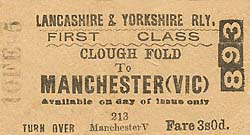 |
The line proved popular, and passenger numbers increased to such a degree that the LYR decided to double the line between Rawtenstall and Bacup. Authorisation for the works was given on 24th July 1876. In addition to formidable obstacles to the works requiring large scale engineering tasks - such as the creation of a new parallel tunnel at Newchurch - . |
Clough Fold station could not accommodate two lines and had to be completely rebuilt
The rebuilt station was completed by November of 1879. It consisted of an island platform reached by a gate at the level crossing. The station’s facilities were located on the island platform. They consisted of a wooden single-storey building which contained a booking office, staff accommodation, waiting facilities and toilets. The building had canopies to protect passengers from the elements. East of the level crossing, between the running lines, was Clough Fold signal box. It controlled both the level crossing and a siding south of the line which served a gas works. There were three other private sidings (Ashworth's, Hareholme and Union) but no goods facilities at the station.
By the time the new facilities at Clough Fold had opened trains to and from Manchester had been diverted south of Bury from the route via Clifton Junction to a new line via Prestwich.
In 1914 the LYR introduced a ‘Rail-motor’ service – known affectionately as ‘Little Billie’ - between Ramsbottom and Bacup; this called at all stations, including Clough Fold, and supplemented trains that ran through to Manchester. From 11th April 1916 through passenger services to Manchester were diverted once more, this time to travel via Heywood, |
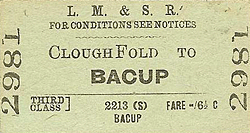 |
adding a considerable mileage to their journeys. The reason for the change was that from this date electric services began on the Bury to Manchester (via Prestwich) line. Passengers for Manchester from Clough Fold were encouraged to change onto the electric trains at Bury for a quicker onward journey, and most of them did so. Within a few years many southbound services terminated at Bury Bolton Street.
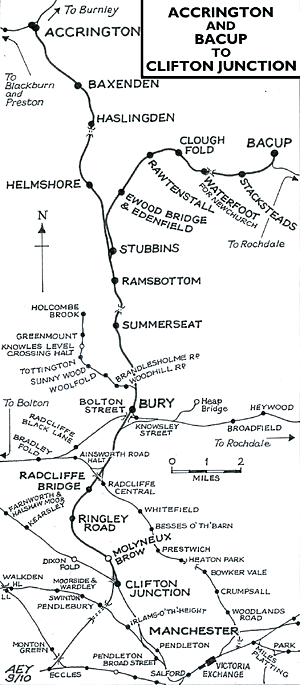 |
On 2nd April 1917 Clough Fold station closed as a war time economy measure; it reopened in October 1919.
On 1st of January 1922 Clough Fold became part of the London & North Western Railway (LNWR) when that company absorbed the LYR. However only one year later, on 1st January 1923, the LNWR became part of the London Midland & Scottish Railway (LMS). By summer 1932 the station had thirty services travelling northbound to Bacup on weekdays. The first service which had originated from Ramsbottom left at 6:33 am. The last service which had originated from Bury Bolton Street left Stacksteads for Bacup at 11:44 pm. Of the thirty services most trains had started from Bury Bolton Street or from Manchester Victoria., but one train had commenced its journey from Bury Knowsley Street and one from Bolton. Some services had started from Ramsbottom and two trains started from Rawtenstall. On Tuesday and Fridays only there was an additional service to Bacup at 5:47 pm which originated at Ramsbottom.
In the southbound direction there were twenty-eight weekday departures, the first being for Middleton Junction at 05:29 am. The last train was for Bury Bolton Street and it left Clough Fold at 10:18pm. The rest of the services tended to travel either to Manchester Victoria or Bury Bolton Street, but there were trains at 09:09am, 10:29am and 3:04pm which went to Bury Knowsley Street, as well as shorter workings to Ramsbottom. There were |
two services from Clough Fold that terminated at Rawtenstall.
On 1st January 1948 Clough Fold became part of the nationalised British Railways (London Midland Region). In 1954 the line between Bury and Bacup was considered busy enough to warrant the introduction of modern rolling stock, and it was reported in the local press that new diesel multiple units (DMUs) were to be introduced; they entered service on the line in February 1956. Clough Fold had thirty-five trains in each direction, giving a half-hourly service: the most intensive that the line would see.
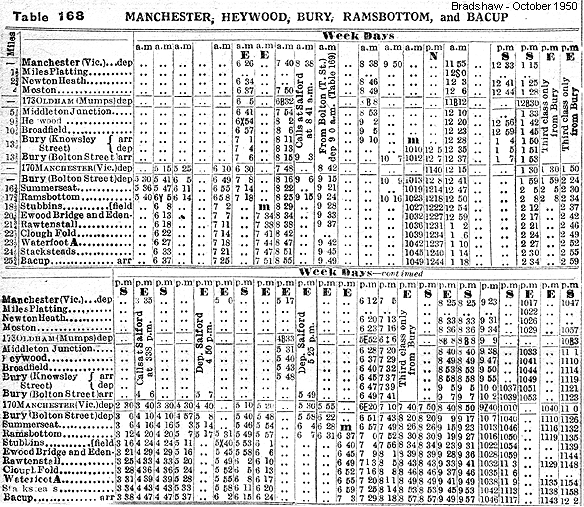 |
The purpose of The Reshaping of British Railways(Beeching Report) of March 1963 was to create an economically viable network, involving the closure of many loss-making passenger lines and stations. The report’s proposals for Lancashire and north Manchester were astonishing. The entire route from Manchester via Bury Bolton Street to Bacup and
|
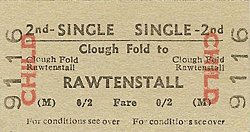 |
Accrington was earmarked for closure, yet the nearby Manchester – Oldham – Rochdale and the Bolton – Bury Knowsley Street – Rochdale lines were not. The absurdity of withdrawing passenger services on the heavily used, electrified service between Manchester and Bury was acknowledged when, on 8th February 1965, the Minister of Transport refused consent to closure. However on 14th September 1966 the Minister gave permission for the Rawtenstall to Bacup and Bury to Accrington lines to close, which they did on 5th December 1966. The final passenger train left Clough Fold on Saturday 3rd December 1966; the signal box also closed in December 1966 although private sidings at the station remained in use. Goods services continued to pass through Clough Fold for a short period up to 1968 after which the line closed completely. By February 1969 the track through the station had been lifted.In 1976 all that remained was the island platform. By August 2010 the site had been landscaped, removing all evidence that a railway and station had ever existed at Clough Fold.
Tickets from Michael Stewart , route map drawn by Alan Young
Other web sites: www.bacuptimes.co.uk, includes further history and pictures of the Bacup line.
Click here to see of film of a train journey between Bury and Bacup in 1966
See also the Ramsbottom Model Railway Club web site which features 106 old photographs of the East Lancashire Railway and photographs of the clubs excellent layout of Ramsbottom & Stubbins.
Sources:
To see other stations on the East Lancashire Railway Clifton Junction - Bacup line click on the station name on the station name: Clifton Junction, Molyneux Brow, Ringley Road, Radcliffe Bridge, Withens Lane, Bury Bolton Street, Summerseat, Ramsbottom, Stubbins, Irwell Vale (new station on the ELR), Ewood Bridge & Edenfield, Rawtenstall, Waterfoot for Newchurch, Stacksteads & Bacup
See also Stubbins Junction to Accrington:
Helmshore, Haslingden, Baxenden & Accrington |

fold_old8.jpg)

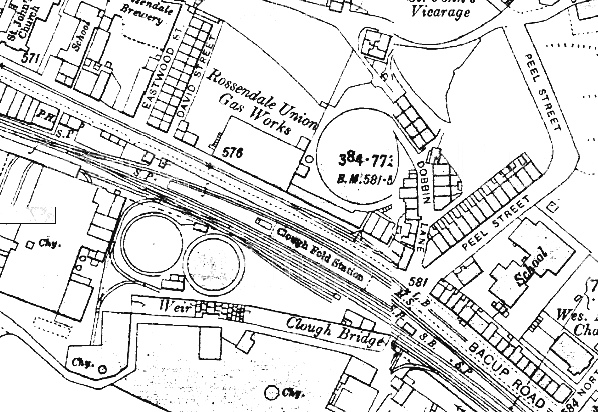
fold_old13.jpg)
fold_old7.jpg)
fold_old9.jpg)
fold_old2.jpg)
fold1.jpg)
fold1.jpg)





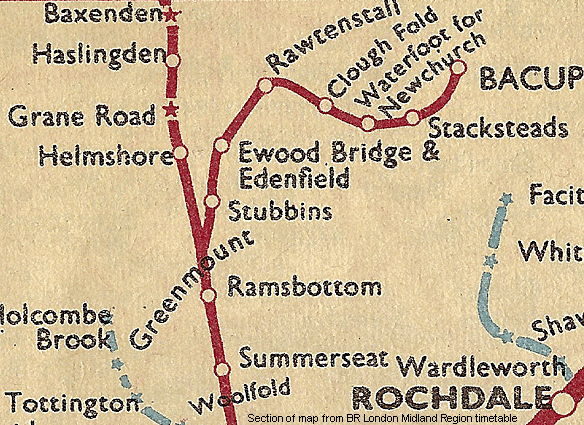
fold_old_thumb1.jpg)
fold_old_thumb3.jpg)
fold_old_thumb4.jpg)
fold_old_thumb5.jpg)
fold_old_thumb6.jpg)
fold_old_thumb10.jpg)
fold_old_thumb12.jpg)
fold_old_thumb11.jpg)
fold_thumb2.jpg)

 Home Page
Home Page